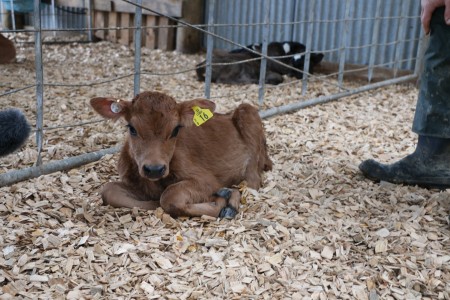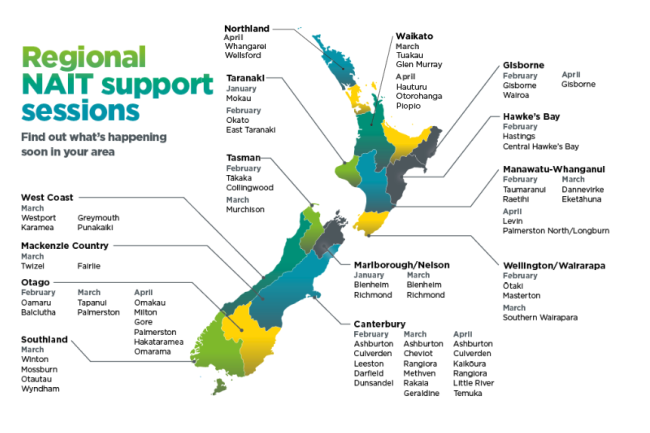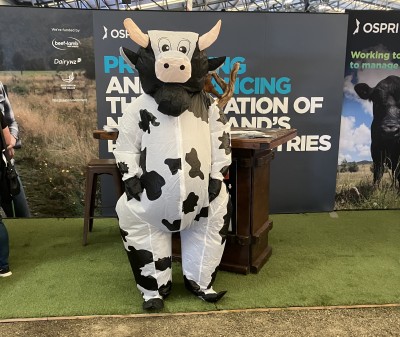 Buying or selling calves? Be a mate, update NAIT
Buying or selling calves? Be a mate, update NAIT
With calf sales picking up, it’s important to make sure that your movements are done right. Here’s what you need to know to meet your NAIT obligations and play your part in supporting lifetime traceability.
Remember your NAIT basics
When you buy or sell calves, your NAIT and TBfree obligations remain the same as for other cattle.
NAIT basics to remember:
- fit all calves with a NAIT tag before they reach 180 days old or before their first movement off-farm, whichever comes first (the tag should preferably be in the central or inner part of the right ear, between two veins)
- register any fitted NAIT tags within 7 days of tagging or before first movement off-farm, whichever comes first
- using a tag scanner makes registering your animals and recording movements easier.
For more information, have a look at our checklist for the steps you need to take when you are buying or selling calves.
Need help with NAIT or TBfree? Come to one of our NAIT support sessions
Our Regional Partners are hosting support sessions across the country where they'll cover a variety of topics related to NAIT and TBfree, including:
- meeting your NAIT obligations
- TB testing queries
- signing up to MyOSPRI.
Don't see a session happening near you? While there might not be any listed there currently, we frequently update our upcoming events page with what's happening soon.

 From beehives to bovines - Meet Clifton King, OSPRI’s Head of Traceability
From beehives to bovines - Meet Clifton King, OSPRI’s Head of Traceability
Most people wouldn’t notice the similarities between managing disease in cattle herds and apiaries, but it turns out the two have quite a lot in common.
Growing up on an orchard in Onepu, Clifton has been a part of the rural community right from the get-go. After studying at Massey to become a vet, he went straight back to working with farmers – 12 years of working with dairy cows with some sheep, beef, and deer practice on the side.
It was during his time as a vet where he developed an interest in factors that impacted the health of the whole herd, and a passion for biosecurity. “What spun my wheels was when I worked with farmers and made changes that improved the productivity, health and fertility of their herd – not just for one year, but every year thereafter. Getting into biosecurity meant I could look out for the national herd”.
From there, Clifton spent another 12 years with what was then called the Ministry of Agriculture and Forestry (now the Ministry for Primary Industries) working in the post-border biosecurity area. He began as an incursion investigator and ended with leading the development of systems that would be used to respond to outbreaks of exotic diseases, such as Foot and Mouth disease.
Moving on from MAF, Clifton spent 5 years working in the Health Sector and then moved to the bee industry, becoming Manager of the National American Foulbrood Pest Management Plan. American Foulbrood (AFB) is a fatal disease that affects honeybees – severely weakening the colony and eventually killing it. While not highly contagious on its own, AFB can easily spread between hives and apiaries through beekeeping practices.
The National American Foulbrood Pest Management Plan requires roughly 10,000 beekeepers to take actions to eliminate AFB from their beehives and make declarations relating to specified disease control activities. This has strong parallels with the NAIT scheme's requirement for cattle and deer farmers to register animals and declare NAIT locations and movements.
Clifton joined OSPRI as Head of Traceability in July 2023 and often reflects on his experience as a vet and time spent in the biosecurity space. “OSPRI had always been on my radar. I already knew quite a lot about NAIT from my time at MAF and after working on the AFB programme it felt like a good fit - but it was also good to get back to working with farmers”.
A focus for Clifton is ensuring NAIT is accessible as it can be for the 97,000+ currently registered PICAs. “Farmers didn’t go into farming to record data and use computer systems – they’re busy people. Making sure the system is as easy to use by looking at the areas farmers struggle with means they can save time, and it improves the information that the system holds”.
Although he has a bit less time to do so these days, Clifton is still eager to pull out the gumboots and get out there on-farm. “Even in my biosecurity roles, there’s always been a heavy rural focus. Getting the gumboots out and connecting with farmers is one of the best ways to get the pulse of the rural community”.


 OSPRI at Southern Field Days
OSPRI at Southern Field Days